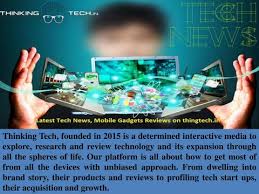The Impact of Digital Technology on Society
Over the past few decades, digital technology has revolutionised the way we live, work, and interact with one another. From smartphones to social media platforms, the influence of digital tech is pervasive and continually evolving.
Enhanced Communication
One of the most significant benefits of digital technology is its ability to enhance communication. With the rise of instant messaging apps and video conferencing tools, people can now connect with others across the globe in real-time. This has transformed how we communicate in both personal and professional settings.
Increased Efficiency
Digital technology has also led to increased efficiency in various industries. Automation software, data analytics tools, and cloud computing services have streamlined processes and improved productivity. Businesses can now operate more effectively and deliver products and services at a faster pace.
Social Impact
On a societal level, digital technology has brought about significant changes. Social media platforms have altered how we socialise and consume information, influencing public discourse and shaping cultural trends. However, concerns about data privacy, online security, and the spread of misinformation have also emerged as critical issues that need to be addressed.
Economic Opportunities
The digital tech industry has created numerous economic opportunities worldwide. Start-ups and tech companies are driving innovation and job creation, contributing to economic growth in many regions. The demand for skilled workers in areas such as software development, cybersecurity, and digital marketing continues to rise.
Looking Ahead
As digital technology continues to advance rapidly, it is essential for society to adapt to these changes responsibly. Embracing innovation while addressing ethical concerns will be crucial in maximising the benefits of digital tech for individuals and communities alike.
Exploring Digital Technology: Key Questions and Insights for the Modern Era
- What is digital technology?
- How has digital technology changed the way we communicate?
- What are the benefits of using digital technology in business?
- How does digital technology impact privacy and security?
- What are the current trends in digital technology?
- How can individuals stay safe online in the age of digital tech?
- What skills are important for a career in digital technology?
- How is artificial intelligence transforming the field of digital technology?
What is digital technology?
Digital technology refers to the use of electronic devices, systems, and applications that operate using digital signals and data. It encompasses a wide range of technologies, including computers, smartphones, the internet, and software programs. Digital technology enables the processing, storage, and transmission of information in a digital format, revolutionising how we communicate, work, and access information. From online shopping to social media platforms, digital tech has become an integral part of modern society, shaping how we interact with the world around us.
How has digital technology changed the way we communicate?
Digital technology has fundamentally transformed the way we communicate in today’s interconnected world. The advent of smartphones, social media platforms, and instant messaging apps has revolutionised how we interact with one another. Communication has become more instantaneous, convenient, and globalised, allowing individuals to connect across vast distances in real-time. The integration of video calls, voice messages, and emojis has added new dimensions to our conversations, making them more expressive and engaging. Moreover, digital technology has facilitated the sharing of information and ideas on a massive scale, shaping the way we express ourselves and engage with others in both personal and professional contexts.
What are the benefits of using digital technology in business?
Digital technology offers a multitude of benefits for businesses seeking to enhance their operations and stay competitive in today’s digital landscape. By leveraging digital tools and platforms, businesses can streamline processes, improve efficiency, and increase productivity. Digital technology enables seamless communication with customers and employees, facilitates data analysis for informed decision-making, and opens up new avenues for marketing and reaching a wider audience. Embracing digital technology in business operations can lead to cost savings, faster growth, and a stronger competitive edge in the market.
How does digital technology impact privacy and security?
Digital technology has a profound impact on privacy and security, raising concerns about the protection of personal data and information. With the increasing digitisation of services and the collection of vast amounts of user data, individuals are at risk of privacy breaches and potential cyber threats. From online tracking to data breaches, the interconnected nature of digital technology poses challenges in safeguarding sensitive information. As a result, there is a growing need for robust cybersecurity measures, transparent data practices, and regulatory frameworks to mitigate risks and protect individuals’ privacy rights in the digital age.
What are the current trends in digital technology?
The current trends in digital technology encompass a wide range of innovative developments that are shaping the way we interact with the digital world. From artificial intelligence and machine learning to the Internet of Things and blockchain technology, the landscape of digital tech is constantly evolving. Augmented reality and virtual reality are gaining traction in various industries, offering immersive experiences and new opportunities for engagement. Cybersecurity measures are also a significant focus, as businesses and individuals strive to protect their data in an increasingly interconnected digital environment. Keeping abreast of these trends is essential for staying competitive and harnessing the full potential of digital technology in today’s fast-paced world.
How can individuals stay safe online in the age of digital tech?
In the age of digital technology, ensuring online safety has become paramount for individuals. To stay safe online, it is essential to practice good cyber hygiene by using strong, unique passwords for each account and enabling two-factor authentication where possible. Being cautious of phishing attempts and suspicious links can help prevent falling victim to online scams. Regularly updating software and antivirus programs can also strengthen defences against cyber threats. Additionally, being mindful of the information shared online and adjusting privacy settings on social media platforms can enhance personal data protection. By staying informed about cybersecurity best practices and exercising vigilance while navigating the digital landscape, individuals can safeguard themselves against potential online risks.
What skills are important for a career in digital technology?
In the rapidly evolving landscape of digital technology, certain skills are essential for a successful career in this field. Proficiency in programming languages such as Python, Java, or C++ is crucial for developing software and applications. A strong foundation in data analysis and interpretation, along with knowledge of tools like SQL and data visualization software, is valuable for making informed decisions based on data insights. Additionally, skills in cybersecurity, cloud computing, and artificial intelligence are increasingly sought after to address the growing need for secure and innovative technological solutions. Continuous learning, adaptability to new technologies, and effective communication skills are also key attributes that can help individuals thrive in a career in digital technology.
How is artificial intelligence transforming the field of digital technology?
Artificial intelligence (AI) is profoundly transforming the field of digital technology by enhancing capabilities across various sectors. AI algorithms and machine learning models are enabling computers to process vast amounts of data more efficiently than ever before, leading to smarter decision-making and automation of complex tasks. In areas such as healthcare, AI is being used to improve diagnostic accuracy and personalise treatment plans. In finance, it aids in fraud detection and risk management. Furthermore, AI-driven technologies like natural language processing and computer vision are revolutionising user experiences by providing more intuitive interfaces and advanced functionalities. As AI continues to evolve, it promises to drive further innovation in digital technology, creating new opportunities for industries to optimise their operations and deliver enhanced services.




